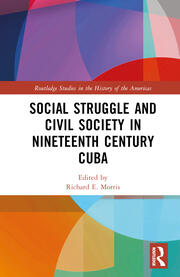Social Struggle and Civil Society in Nineteenth Century Cuba
–edited by Richard E. Morris

Available March 10, 2023, from Routledge
This collection of research from Cuba scholars explores key conflicts, episodes, currents, and tensions that helped shape Cuba as a modern, independent nation.
Cuba in the nineteenth century was characterized by social struggle. Slavery, Spanish colonial rule, and racial tension permeated every corner of Cuban life—from urban dwelling to house of charity, from sugarcane field to tobacco vega, from seaport to railway—and furnished a lively spectacle for the privileged foreigner gazing upon Cuba from afar. Chapters discuss topics including slavery, gendered forced labor, indentured labor, agricultural economics, industrial development, newspaper and print culture, and the origins of the "Cuba Threat." The volume links key aspects of Cuba’s history, such as social conflict and economic underdevelopment, to present a detailed analysis of Cuban civil society in the 1800s.
Social Struggle and Civil Society in Nineteenth Century Cuba appeals to general readers and scholars in a range of disciplines, including history, women’s studies, economics, architectural preservation, media studies, and literature.
Table of Contents
Introduction
Richard E. Morris
1. Transformations of the Cuban Plantation System and the Transatlantic Slave Trade
During the Long Nineteenth Century
William C. Van Norman, Jr.
2. Tobacco in the Age of Cuba’s Second Slavery
William A. Morgan
3. A Racial Economy of Care: Incarceration, Labor Extraction, and Charity in Cuba’s
Nineteenth-Century Slave Society
Bonnie A. Lucero
4. Breaking Chains: Resistance, Freedom, and the End of Chinese Indentured Labor in
Cuba
Benjamín N. Narváez
5. Cuban Industrial Development and Its Heritage
Ilka Pell Delgado
6. Dreams and Nightmares in the Planter’s Metropolis
Asiel Sepúlveda
7. Bullfights, Cockfights, and Other Evils: Origins of the "Cuba Threat" in U.S. Travel
Literature
Richard E. Morris


